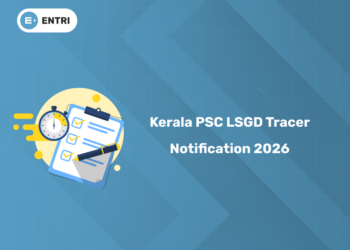The Kerala PSC has released the Training Instructor (MMV) Notification 2025 with 1 vacancy under Category No. 358/2025 – 359/2025. The online application is open from 15/09/2025 to 15/10/2025. With the exam date announced, early preparation is key. This article provides a complete list of study materials, resources, and tips to help candidates plan their studies.
Kerala PSC MMV Training Instructor Notification 2025 Highlights
| Event | Details |
| Conducted By | Kerala Public Service Commission (PSC) |
| Post | Training Instructor (MMV) |
| Category No | 358/2025 – 359/2025 |
|---|---|
| Department | Scheduled Castes Development Department |
| Number of Vacancies | 01 |
| Application Dates | 15/09/2025 – 15/10/2025 |
| Mode of Application | Online (One Time Registration) |
| Official Website | Kerala PSC Official Site |
Syllabus PDF – Start with the official Kerala PSC Training Instructor syllabus 2025 to understand all topics, weightage, and exam pattern, which helps plan your preparation.
The Kerala PSC Training Instructor (MMV) exam carries 100 marks with 100 multiple-choice questions (MCQs). Candidates have 1 hour and 30 minutes to complete the test, and a 1/3 mark penalty is applied for each incorrect answer.
| Subject / Module | Marks |
|---|---|
| Basic Engineering Drawing | 10 |
| Chain Survey | 12 |
| Compass Survey | 12 |
| Plane Table Survey | 5 |
| Levelling & Contouring | 15 |
| Theodolite Survey | 10 |
| Modern Survey Instruments | 8 |
| AutoCAD | 8 |
| Workshop Calculation & Science | 12 |
| Building Materials & Construction | 8 |
| Total | 100 |
Previous Year Question Papers (PYQs) – Solve old exam papers to understand frequently asked questions, important topics, and the level of difficulty, which helps identify focus areas.
| Question Paper Code | Download PDF |
|---|---|
| 136/2023 | |
| 33/2023 | |
| 007/2020 | |
| 59/2019 |
MCQs Practice – Regularly practice multiple-choice questions covering all subjects, including numerical problems, diagrams, and theory, to strengthen knowledge and improve confidence.
Notes & Handouts – Create concise notes for formulas, constants, definitions, and diagrams to make revision easier, especially for last-minute preparation before the exam.
Mock Tests – Attempt subject-wise mock tests to simulate real exam conditions, improve speed, accuracy, and time management, and identify weak areas that need more practice.
| Mock Test Series | Link |
| Series 1 | |
| Series 2 | |
| Series 3 | |
| Series 4 | |
| Series 5 |
Video Tutorials – Use video lessons for practical subjects like survey instruments, AutoCAD, and modern tools to understand concepts visually and reinforce learning.
Diagram Practice Sheets – Draw curves, contours, survey instruments, and layouts repeatedly to improve accuracy and speed in diagram-based questions in the exam.
Flashcards – Make flashcards for formulas, units, constants, and key points for quick revision, which helps retain information better and strengthens memory recall.
Exam Strategy Guides – Follow guides explaining how to approach questions, manage time, attempt OMR sheets correctly, and reduce negative marking to maximize your overall score.
Conceptual Understanding – Focus on understanding the basic concepts of surveying, drawing, construction, and workshop science rather than rote memorization for better application in MCQs.
Numerical Practice – Solve numerical problems daily from topics like levelling, chain survey, and workshop calculations to improve accuracy, speed, and confidence in solving quantitative questions.
Revision Schedule – Regularly revise all subjects in intervals, focusing more on difficult topics and formulas, ensuring long-term retention and quick recall during the exam.
Self-Assessment – Periodically evaluate your preparation through self-assessment tests to identify strong and weak areas, and adjust your study plan accordingly for maximum efficiency.
Interactive Learning Tools – Use apps like Entri and online platforms for quizzes, flashcards, and interactive exercises to make preparation engaging and enhance understanding of technical concepts.
Group Study Sessions – Discuss difficult topics with peers or study groups to clarify doubts, exchange tips, and reinforce learning through teaching and discussion of important concepts.
Notes for Quick Revision – Maintain a separate notebook with short notes, key formulas, and essential points for last-minute revision, which is highly useful during the final days before the exam.










